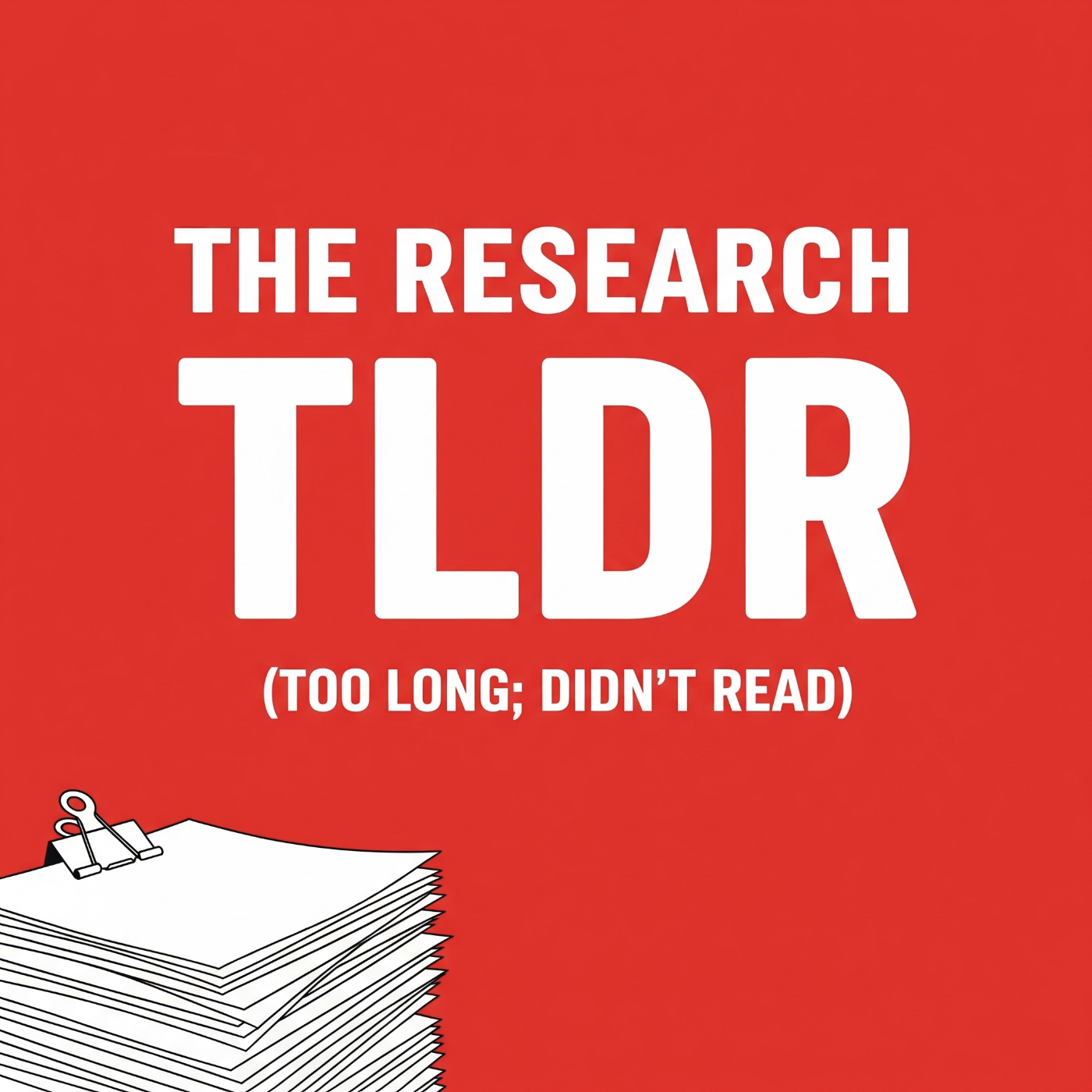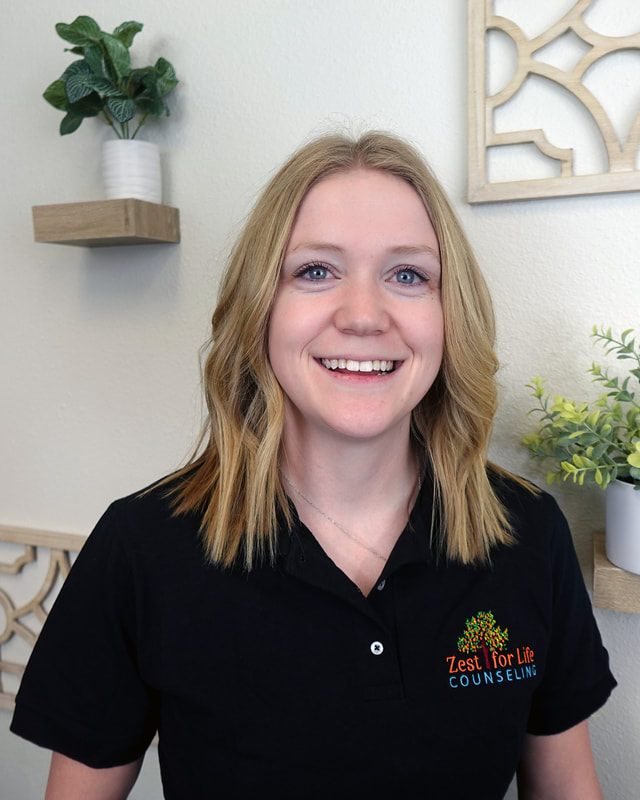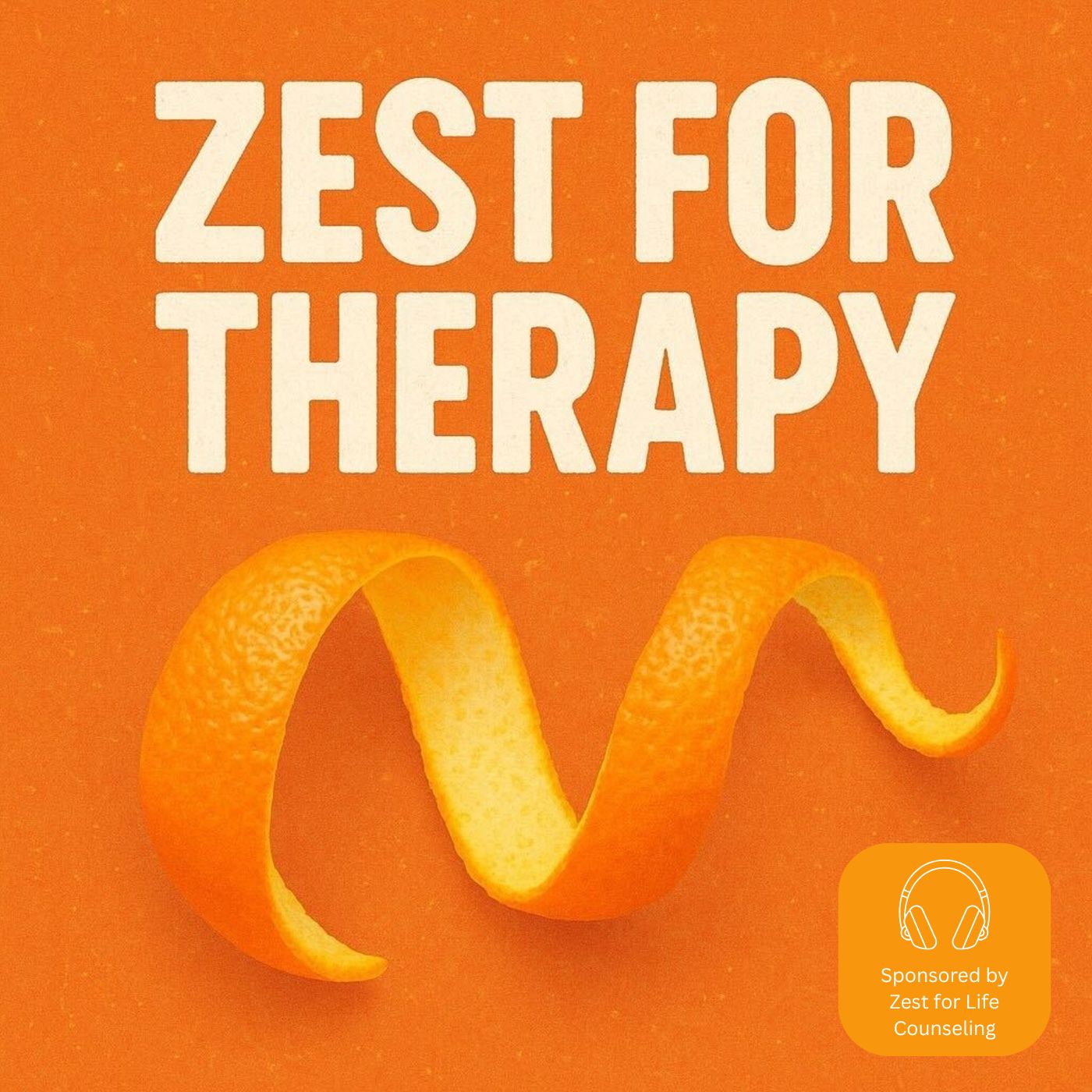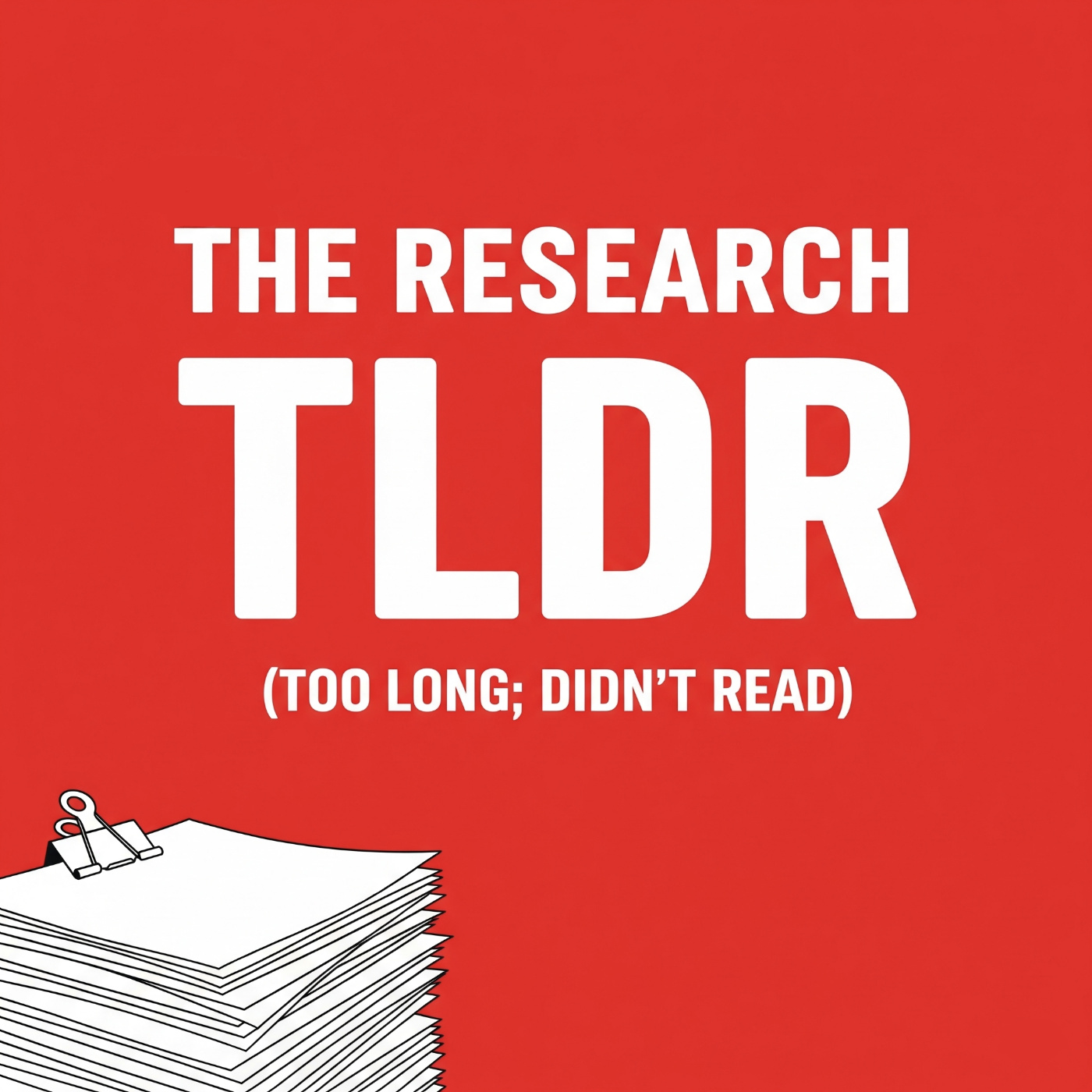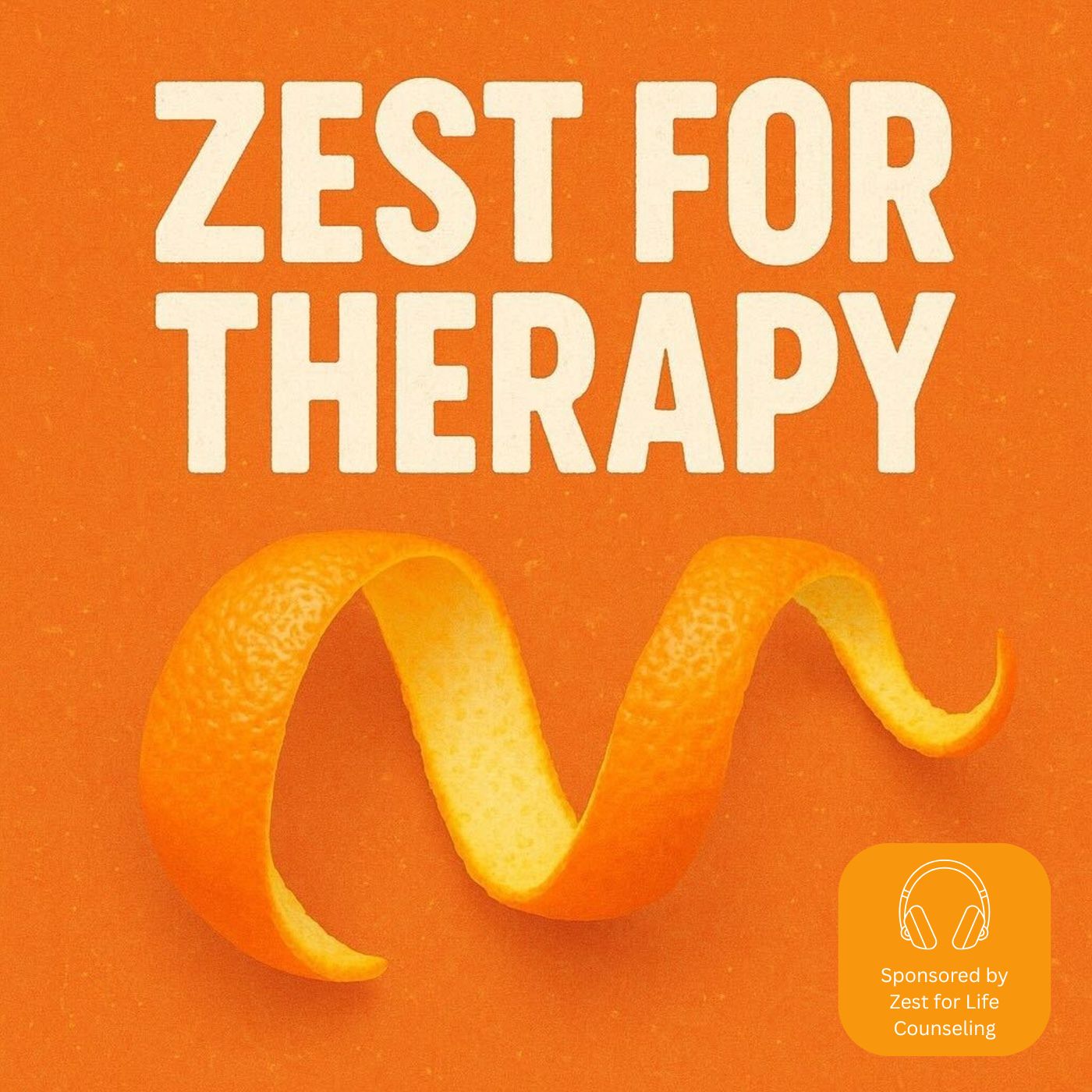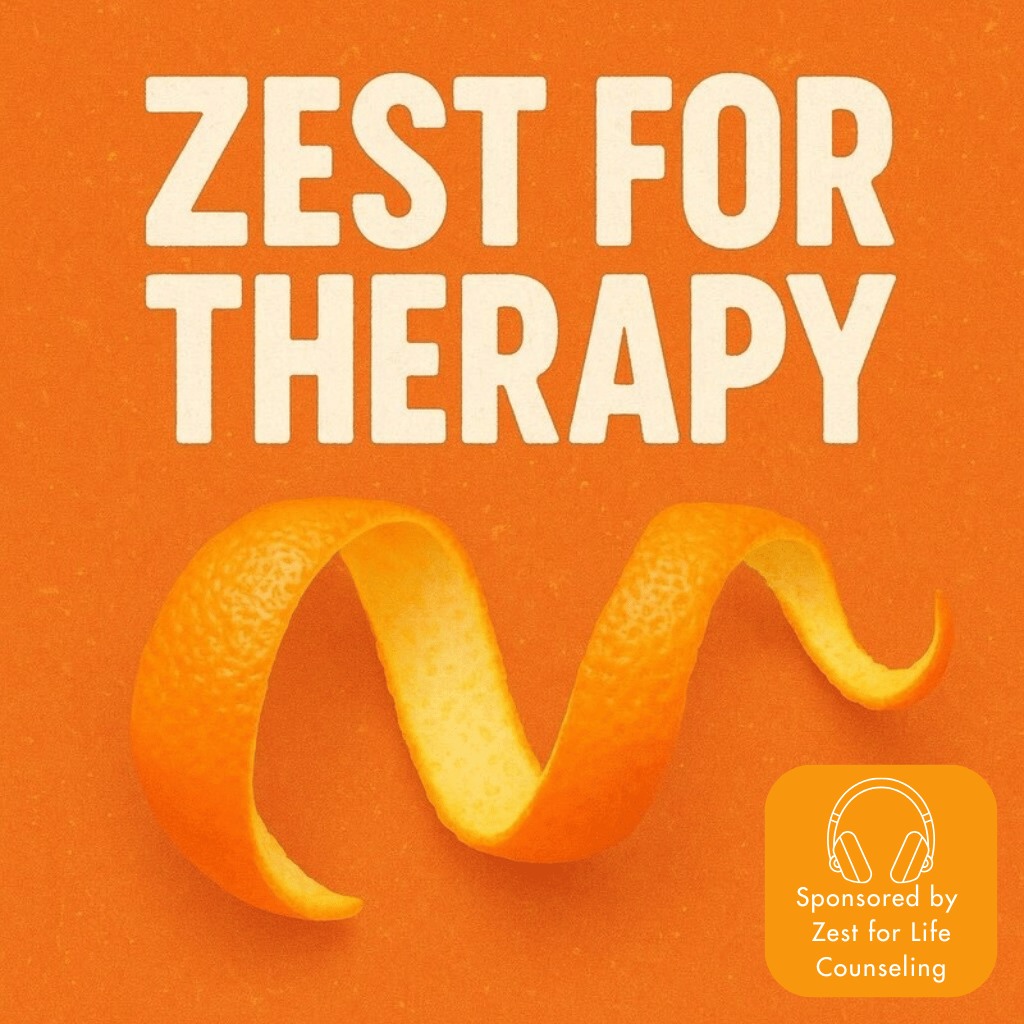Episode Transcript
[00:00:00] Speaker A: Foreign.
Welcome back to the Zest for Therapy podcast. We are your co hosts, Courtney Delman, Celeste Webster, Cole Childers. Back with another episode of the Research TLDR where we dive into the most recent research about different issues in the practice of therapy, including diagnoses, presenting problems, and self of the therapist issues.
Our too long didn't read topic today is burnout. As a mental health professional, while we.
[00:00:31] Speaker B: Are therapists, we are not your therapists. This podcast is intended for informational and entertainment purposes only. It does not constitute therapy, clinical supervision, or medical advice. Opinions expressed are our own and subject to change as research evolves. We do our best, but we're human and that means we may make mistakes.
[00:00:51] Speaker C: Alrighty, Courtney. So get us started on today's topic. Why is burnout an important topic for us to do a research team TLDR on?
[00:00:58] Speaker A: Yeah, so therapist burnout is honestly a really big passion of mine. I firmly believe everybody should know what we actually mean when we're talking about burnout and what effective self care for burnout is. I think there's a lot of myths about burnout, especially on these topics and self care especially. I think we've all heard something to the effect of like, oh, just go get ice cream or like watch your favorite show or take a nice bubble bath as forms of self care. And I I don't think they actually are. But before we get into that, let's define burnout and self care so we are on the same page.
[00:01:29] Speaker B: Yeah, a good Ben and Jerry's is always satisfying in the moment, but yeah, might not be the best thing for us. Okay, definition time. Burnout is mental, physical and emotional exhaustion resulting in detachment as a result of performing emotionally demanding tasks or working or working at a higher rate of output than available resources. Essentially, burnout is becoming exhausted from doing more than you have the capacity to do for too long.
[00:01:55] Speaker C: Which honestly makes total sense for anyone who's been in grad school to see why you might have been burned out during that time. I know I am not currently there. I'm currently in grad school, so I definitely know what that's like and that's common. The research reflects that 50% of marriage and family therapist trainees specifically experience burnout during their MFT grad school programs and even after graduation. 35 and over 50 of psychotherapists in general report burnout concerns or meet criteria for moderate burnout, respectively.
So obviously that comes as no surprise to anyone who has been through a clinical therapy degree or works in the therapy field. We are no Strangers to hearing about burnout, talking about burnout and experiencing it firsthand. What else did we find in the research that stuck out to you, Courtney?
[00:02:41] Speaker A: Something I really liked from the Malik article that we'll link is they brought up, like, depersonalization as a part of burnout. And when we're talking about depersonalization in burnout, we're not talking about the same depersonalization as a part of dissociation or PTSD or trauma. What we're actually talking about is when we start to care less about our clients, when we start to be less empathetic with them, we start to see them less as people. That's the depersonalization that we're talking about.
What have you guys experienced with clients or, like, in other areas about burnout or depersonalization?
[00:03:18] Speaker B: Yeah, that's a really good question. So I would say that I've definitely experienced that depersonalization with clients. So the work we do, I've worked in different capacities of direct therapy, one on one, working with clients and other work in group settings. And I've seen in both of them, when I've personally experienced burnout without recognizing it or trying to prevent it, that I. I get exhausted trying to implement plans. Like, this is a really mentally exhausting work. You have to put a lot of mental energy into things.
And so it's. I feel like I'm coming in. If my baseline is, oh, I'm 100% working on these things. When I'm burnt out, it's okay. I'm coming into the workday 80%, 70%, 60%. I'm anxious at home.
I'm not detaching from work. I'm thinking about work at home and stressful situations like that, if that makes sense.
[00:04:15] Speaker A: Yeah. Kind of like that opposite effect of like, it's coming home with you.
Yeah.
[00:04:20] Speaker C: So that's.
[00:04:20] Speaker A: What about. What about your experiences with that?
[00:04:22] Speaker C: I think I've definitely experienced it in the sense of, like, working with clients. I was a case manager for three years, and it definitely showed up there when I was feeling burned out with school and all the things that were balancing during school, because internships don't really pay, so sometimes you gotta do a job on the side. It's a whole bunch of balancing. I think, on top of that, to add to what Cole said, it's definitely.
It impacts not just work, it impacts home life, too. So that's kind of the point that I want to make, is just like, we get home and we try to pour out of an empty cup, and sometimes it Looks ugly. So it impacts life.
[00:04:55] Speaker A: Right. Or like, I think to that point, a lot of times people are like, I don't have time for self care. I don't have time to do anything different than what I'm already doing because I'm at capacity. Right, Definitely. And I think the that too. Like, it's not just that this impacts our work and our home life or how we feel about our clients. I think it's also like an ethical consideration too.
You know, I think a lot of times, like people get really down on themselves for being good therapists and making sure they do good for their clients.
But this ethical consideration that I want to touch on is more like yourself. Like, it's also an ethical consideration and ethical consideration for you because one of the effects. So the apa, like American Psychological association has put out their recommendations for burnout and self care. And it's talked about like, the risks of burnout. There's increased risk to our physical health when we're burned out, like getting headaches, musculoskeletal pains, 50% increase in calling out of work for more than two weeks due to illnesses, and 180% increased risk of developing depressive disorders, 84% increased risk of type 2 diabetes and 40% increased risk of hypertension. So even if you're not like cognitively recognizing, like, I'm burned out, I am struggling, I am connecting less with my patients or my clients. Your body is still experiencing the stress from burnout.
[00:06:28] Speaker C: Yeah.
Yeah. That's scary. On top of a sedentary job, that's definitely not okay. And it's definitely like, for me, I hold stress in my body. It's like in my shoulders, like I tense up. And so yeah, our body feels it.
[00:06:42] Speaker B: No, for sure, it's, it's a big issue. And we know like this is true and we feel the difference when we have a supportive environment or our bosses listen to us, like the issues we have, especially as interns and pre fully licensed therapists. And most people, unfortunately, who experience burnout end up leaving their career entirely. It's pretty rough seeing the turnover not just at jobs, but in the career path.
[00:07:07] Speaker A: Yeah. Which also makes it harder. Like this isn't therapy specifically, but in other, like social work or other mental health works in general.
We see a lot of high caseload, low staff, high burnout, high turnover. And it's kind of that cycle that just keeps going.
[00:07:26] Speaker C: Yeah, there was a high percentage there, wasn't there?
[00:07:28] Speaker A: It's like 70% crazy.
[00:07:31] Speaker C: And if you're anything like Me. All these numbers definitely just make me more stressed out.
So I'm sure that doesn't help with the whole burnout factor. Just adds to the wonderful pie we're making.
So don't worry, we won't leave you hanging with any tools that. Without any tools. We'll go over that at the end, so stay tuned.
[00:07:49] Speaker A: And while there are factors that contribute to burnout that we have some limited control over, like if you're in a grad school program right now, might not be feasible for you to just drop out and find a different one that you think might be more supportive or more conducive. And realistically, like, sometimes we don't have control over the kind of environment that we're in. Clinical programs are stressful, they just are.
And sometimes our working environments are stressful and we can't always just leave.
But. And we'd love to talk more about some of those things in a future episode, but there are a lot of things within our control that don't take a huge drastic life change to rectify. And some of those factors are like engaging in self care, going to our own therapy, and fostering supportive relationships inside and outside of work.
[00:08:34] Speaker C: Absolutely. I think we've all been in the headspace though where we think maybe I'll.
[00:08:39] Speaker A: Just drop out of grad school, right? Yes.
[00:08:41] Speaker C: So we've definitely all been there. Yes.
But yes, self care. So according to research, self care is defined as the awareness of an attention to one's emotional and physiological needs in ways that impact daily living, social relationships and the environment to be more conducive to meeting those needs. So basically that's being mindful of how we're feeling emotionally and physically and seeing how that impacts how we intentionally show.
[00:09:05] Speaker A: Up in our world.
Which answers the question why eating ice cream, taking a bubble bath, like watching our favorite show, like those things feel nice, but they're actually missing the point. I think a lot of ways doing the opposite of what we need to be doing, they don't help us recognize our needs, they don't help us address our needs. And effective self care is not just like a one time event. It's an increased awareness and attention to our needs in ways that promote health and well being.
[00:09:32] Speaker B: Yeah, for sure. And I don't want to get things wrong with this, but there's definitely like the pop psychology type of things, like an Instagram post or a reel or a TikTok or whatever that tells you, like these very, very cliche, stereotypical, treat yourself type type things for self care. But I don't think there's bad intention behind that. But we do want to make sure that we're looking at and listening to research and evidence based things. That's what we'll be talking about a bit.
Instead of ice cream to fix your burnout. Not going to work. It's not bad to have ice cream, but there's different self care and coping skills to improve your health overall.
[00:10:13] Speaker A: And Cole, I think that's a good point because it's not like any of these things are bad. It's just sometimes I think we do these things with the hope that it will help us feel better. And then we end up in this cycle of like, oh, I'm doing these things and I'm not feeling, feeling better. Like, why am I not feeling better?
I think that's because we've been told to focus on things that don't necessarily help.
But there are things that do help that don't take a ton of time, that don't take a huge time commitment. It's more of a lifestyle thing. So, Cole? Yeah? What are some of those things?
[00:10:47] Speaker B: I think the big one I wanted to touch on today was self compassion. So that's a huge part of supporting our well being and for preventing burnout.
So as therapists, we're taught to be compassionate for our clients, right? Like we show up, we listen deeply, we hold space for them for the really hard stuff, but then we forget to do that for ourselves and that's a problem. So self compassion totally sounds like one of those cool 2025 buzzwords in mental health care. But it's actually one of the most powerful tools we have to reduce burnout.
So the important piece of this is what does it look like? What does good practice of self compassion look like?
So I want to break it down into three categories.
First one is self kindness. Imagine how you would speak to a struggling client, then do that for yourself instead of beating yourself up for not being good enough air quotes or being tired or something like that. Imagine how someone else, you'd like someone to talk to you or how you would talk to someone else. Because we most of the time are our biggest critics.
Number two is common humanity. So remember, you're doing really hard work helping other people. And with hard works, hard work, we make a lot of mistakes. There's awkwardness, it's very stressful and you aren't broken, you're doing really difficult work.
And the third is mindfulness.
So being present with your emotions while doing your best not to over identify them is A big key. So mindfulness helps us shift from I'm overwhelmed right now to I'm feeling overwhelmed. I'm able to detach those emotions from my identity.
And when we lack self compassion, it's so much easier.
It's so much easier and common to internalize pressures to do better and improve.
It's a protective factor and an ethical practice to be able to practice self compassion. And it's a non negotiable. If we want to stay in this.
[00:12:40] Speaker C: Field without losing ourselves, absolutely definitely practice what we preach for sure.
And just like in therapy with clients, we use like scales and assessments and different measures to see kind of where our clients are at and how they.
[00:12:56] Speaker A: Have improved or maybe how they haven't.
[00:12:59] Speaker C: And we have something similar for clinicians regarding self care, and that's the Mindfulness Self Care Scale.
It's a way to measure where you're at with self care and helps to highlight kind of where you can improve, whether that's, you know, physical activity or emotional regulation, all those things. Courtney, you've used this on a regular basis in your supervision. So what's it been like for you?
[00:13:21] Speaker A: Yeah, so I, I actually use the Mindful Self Care Scale and the Professional Fulfillment Index.
The Professional Fulfillment Index has a really nice, really easy 10 question like burnout scale. And the version of the Mindful Self Care scale that I use, it's free on. I can't remember her name right now, but her website, the professional who made it.
But I recently changed supervisors and one of the first things that I told him was, hey, like I need you to keep me accountable to fill these out because I love them. They help me so much. They help me see how burned out I am. They help me see what areas of self care I might be already doing a really great job at and also what areas might help me feel better. So kind of going back to what Cole was saying, like making sure with the efforts that we have the time and energy that we do have when we're feeling burned out, that that gets to the places that will actually help us feel better.
So some of the questions on the pfi, the Professional Fulfillment Index is like, are you experiencing dread when you're thinking about work? Are you feeling emotionally or physically exhausted? Are you feeling less empathetic? All those things that we've already talked about and it just kind of shows you like, okay, wow, I am really, really feeling this. Or you know what, I'm doing an okay job right now.
And then as far as like the Mindfulness Self Care Scale, it Kind of goes over topics like mindful relaxation, physical care, self compassion, like Cole is talking about, and our purpose, supportive relationships, supportive structure, and mindful awareness. And one thing that I want to note here is being aware of your needs is not the same as meeting them.
And I, I think as therapists, a lot of the times, me especially like when I, the last time I filled out the mindfulness self care sc, I was like, oh, crap. Like, I'm aware of these things, but I'm not necessarily doing anything about it. Like, I conflate the two. And while awareness is like half the battle, the other half is like engaging with yourself, you know, doing the things that actually help.
And so I think this scale in particular does a good job of helping you identify small ways that you can actually meet those needs. Like some of the suggestions on there. And I give this to clients too, to help them get ideas of how they can overcome burnout. But some of them are as simple as like, did you drink water this week? You know, can that be your goal for the next week, is just to put water cups out and you drink them or to bring your water bottle to work?
Or another one is like, I spent time with people who are good to me. Like, did you call somebody who is loving and supporting, supportive? Did you send a text to them? Did you, you know, sit by them while you were doing your homework?
And then another good one that I like is like, I had a calm awareness of my body, so not only recognizing it, but being okay with that. Another good one is like reminding yourself that it's okay to be human and that failure and mistakes are part of life.
So I love that for not having to generate those ideas on my own, but actually having a nice, research, informed way to meet some of those needs.
[00:16:35] Speaker C: Yeah, Like I said, we've all been in burnout zone at one point or another going through school. So kind of to share my own experience with burnout. Yeah, Let me just like set the scene.
So this was back when I was in my bachelor's and I was working a full time job and a part time job on top of being in school full time. So on top of that was just like stress.
That is the definition of stress. And so I like had zero time for what people called self care. And I was like, what are y' all talking about? I'm like trying, but I'm just dying.
And so I would set up these things whereas, like, cool, I'm gonna go rock climbing with my friend in the morning before school. And then that way it like checks, two boxes. I was with my friend and I also went to the gym.
[00:17:22] Speaker A: Yeah, I did it.
[00:17:23] Speaker C: Yeah.
But literally I was dead at the end of every day. And so really what shifted for me was fun fact. School kind of puts you through the ringer. And when it's in regards to doing social work, in my experience, it was like teaching you the things that you need to do to not be burnt out and like what is actual self care. And so we practiced that with one of our classes where we like logged self care, like actual self care.
And I was like, wow, what I'm doing is not self care. It's just adding more to my plate and I don't have room for that.
So that shift for me was, okay, I have time from my walk to the car to school, let me just not think about the next thing or stress about what homework needs to be done. And so for me, my self care looked like in that five minute walk.
I'm going to be mindful of all my surroundings. And I recognized llamas on the walk to school that I had never noticed before. And that made my day. So anyways, that was, that was a shift for me when I came to burnout.
[00:18:25] Speaker A: I love that. And I think that goes back to like finding a habit that's actually sustainable. Like you were going to be walking anyway. It's not like that was adding something. It's not like you could cut that out to make your life easier. You were going to be walking, but being mindful on that walk, like giving yourself time to engage in things that have meaning and purpose to you. I think one of the ones that I tell people a lot when they talk about, like being stressed out at work or having a lot of clients. And maybe you're in a financial situation where you can't necessarily have less clients.
Maybe there are some other options there. But one of the things that I like to tell people a lot with this is, okay, are you ending sessions on time or even going further? Are you ending sessions with enough time, 30 seconds between your sessions to do some deep breathing?
Like, are you giving yourself a second to relax, to recognize, to ground yourself before you go back in?
Because you're gonna be in between clients anyway. Like, that's already something that you're going to be doing. You're already going to be thinking, okay, now I have the next client. So maybe before that saying, okay, let me take a deep breath in and then relax my shoulders. Okay, awesome, now I'm gonna go get my client. And that took three seconds but doing that every single time or maybe doing that, you know, if you have a client that has a presenting problem that's really challenging for you, it's a really easy way to incorporate some of those things into what you'd already be doing.
[00:19:58] Speaker B: Yeah, I like that a lot. I love talking about this because just hearing especially the last two things from both of you, I've realized like Celeste, you talking about how, how busy you were during your bachelor's and just cramming things in, but figuring out how to put in that transition time, things that, that'll be beneficial to help you relax and help you decompress.
Kind of even take away like that somatic, the somatic things that are happening, like relax your body, your shoulders to go into your next thing. And Courtney talking about those transitions in between things, even if it's just, you have one minute in between sessions, just breathe, take three seconds. Like, I've realized, like that's something that I can totally benefit from and that I'd love to work on in my life is.
Life is so busy right now. Like personally I'm not full time in grad school right now, but I will be in a few weeks.
Just what is that? Four classes and 20 hours of an internship plus a part time job.
[00:20:59] Speaker A: I have a toddler and a toddler.
[00:21:01] Speaker B: So trying to figure things out. But I'm like, just because things are busy doesn't mean I can't practice self care. I don't have to have an hour every morning and every evening to go on a nature walk, but I can take time in those transitions to do a body scan. Like those transitions could be really sacred space and time for me and I really want to practice that hearing from both of you.
[00:21:22] Speaker C: Yeah, newsflash. We're humans right here and right now.
[00:21:26] Speaker A: We're learning right here and right now. Yeah, it's not like we are. We never accept experiences. So we know how to, we know how to tell you to never experience it.
Yeah, it's because we've experienced it. It's because you are going to experience it most likely at some point if you haven't already.
And I think that's kind of the realistic human nature of it is this is a tough profession, especially depending on where you work, what you're doing. One of my favorite, one of my favorite quotes in grad school that I would always say, I don't know where it's from, maybe my brain. But I just like, yeah, grad school would have been so easy if I didn't have a Life outside of it. Like if I wasn't a human outside of grad school, it would have been perfect. Like if, you know, it's so easy to think, like if I didn't have health challenges or if I didn't have a toddler, or if I, you know, didn't have this really important relationship or I didn't have this really important thing that I'm involved in the community, maybe I would have enough time to do all the things that my grad school needs or do all the things that my clients needs to take all of the trainings that I want to take.
And the realistic part is you aren't what you do for work. Like we said last time, like you are a human being. And slowing down means giving yourself the space to take care of yourself as a person. Whether that's 30 seconds, five seconds, you know, going back to that scale, whether that's just standing outside in the sun for a minute before you get in your car, just those small ways.
And yeah, I think that's, that's the key is allowing yourself the space to acknowledge that you, you need that and that it's not going to take away from the other tasks you have to do in order to do that. But Celeste, what are some other ways that some of our listeners can get some good ideas on how to help with their self care strategies? Yeah, for sure.
[00:23:21] Speaker C: Like we said, we're not going to leave you hanging and I hope you picked up at least a few things from us in our conversation to take along your way. But here's just a few more and we'll definitely include more in our show notes. But how to identify that we're burned out? Psychology Today has literally a three minute little assessment just to kind of pop quiz. Are you burned out? Yes.
And then what areas of your life need focus?
If that's your question? There's that mindful self care scale that we were talking about. That's a really good and easy one. It breaks it down by section of like area of life. So it kind of gives you that. And then also like little examples of maybe what you could do to experiment a little and kind of see what works for you. Because what we've noted that works for us may not work for you, and that's okay. But give it a try.
If you think it might not work, try it anyways and then get back to us when you're like sold.
[00:24:21] Speaker A: Yeah. And let us know like if you tried something and it worked or you tried something and it didn't work, let Us know.
[00:24:27] Speaker C: Yeah.
[00:24:28] Speaker A: And Celeste, we were talking about this while we were creating the kind of the foundation for our episode today. You're talking about. Brene Brown has this concept of, like, maybe you can explain it, like, being blown over versus, like.
[00:24:45] Speaker C: Yeah.
[00:24:45] Speaker A: Knowing that you're struggling. Overwhelmed versus burnout.
[00:24:48] Speaker C: Yes. Yes. She has her own, like, verbiage for it. And like, I'm totally spacing right now. It's like I'm. Oh, in the weeds or blown. Yeah. So, like, in the weeds is I'm feeling stressed. Things are kind of unmanageable, but I'm okay, I guess maybe I have to delegate. And then being blown is overwhelmed. That's where it's like, I cannot do anything. I'm literally past capacity.
I am beyond help.
So you actually aren't. But that's how it feels.
[00:25:18] Speaker A: Yeah. It feels like, okay, yeah, yeah, I can't do anything else. I can't do one more thing. Like there's nothing else.
[00:25:24] Speaker C: Yeah.
[00:25:24] Speaker A: And I love that because it can kind of give you a good place to say, how overwhelmed am I? Like, is this. Am I in a manageable place where I can work on some of these things, or am I really burned out that I really need to ask for help? Yeah, like, I need to, you know, go to my own therapy. I need to talk to my supervisor about this. I need to see what. What things I can, you know, put on the back burner for now that maybe don't impact me as a human being very much.
And so as you're doing your burnout things, as you're looking at self care things, just be mindful of, like, maybe some of the steps that you really need in addition to some of those manageable self care steps. So. Yeah. Cole, any last things?
[00:26:08] Speaker B: Yeah. I just want to say I'd encourage everybody listening to this to.
To find someone that you can talk to. And hopefully everybody has one, especially if you have a supervisor that makes. Makes it easier, a loved one.
Get an outside perspective on things as well. And ask people to. To give you their perspective on how you're doing.
Just because it's hard to identify in our own life sometimes to connect the dots. And so a compassionate but second perspective can really do wonders when we're trying to figure out how to improve our situations, especially with burnout and overwhelm.
[00:26:47] Speaker A: Yeah. And like, hopefully your supervisors or your colleagues or your friends can help you kind of like lighten the love, even just to share the burden. Like, that's what we do a lot for our clients is being there witnessing being a human being for them. Let other people do that for you.
It's not like you have to do all this on your own.
[00:27:07] Speaker C: Yeah. Newsflash. Crazy.
[00:27:10] Speaker A: Yeah.
Groundbreaking information that we're bringing to you on the Zest for Therapy podcast.
But anyway, so I hope you enjoyed this episode of the podcast. If you have any suggestions or comments, please send them to us. We'd love to keep doing things that help you as your work as therapists. So we hope that you'll join us next time for our next episode on the Zester Therapy Podcast. We'll see ya.
